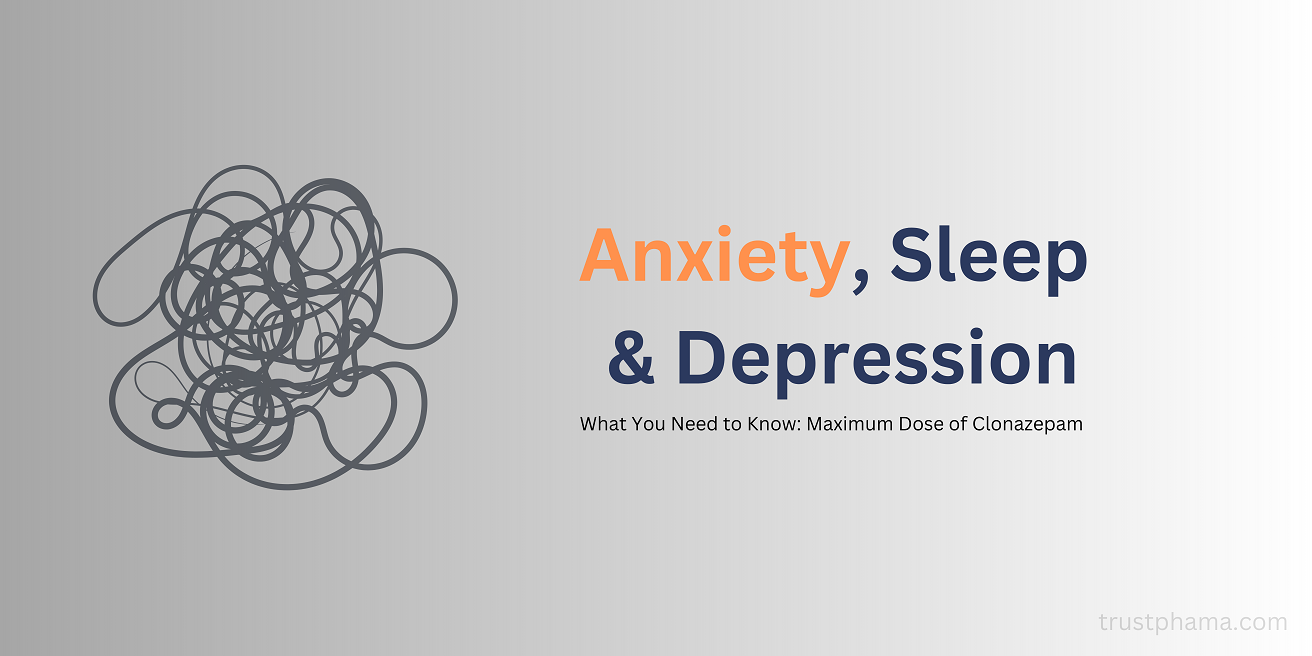Clonazepam, a medication commonly prescribed for anxiety and sleep disorders, and sometimes as an adjunct treatment for depression, is a potent benzodiazepine that works by calming the brain and nervous system. Understanding the appropriate dosing is crucial, as misuse or excessive dosing can lead to serious side effects, including dependence and withdrawal symptoms. This article explores the maximum recommended doses of clonazepam for these conditions and the important considerations to keep in mind.
What is Clonazepam?
Clonazepam is a long-acting benzodiazepine that is primarily used to treat seizure disorders and panic disorders. Due to its sedative properties, it is also prescribed off-label to help manage anxiety, insomnia, and symptoms of depression. Clonazepam works by enhancing the effects of gamma-aminobutyric acid (GABA), a neurotransmitter that inhibits brain activity, thus promoting relaxation and reducing anxiety.
Maximum Dose of Clonazepam for Anxiety
Anxiety disorders are among the most common mental health conditions, and clonazepam is often prescribed to help manage symptoms. The dosing of clonazepam for anxiety can vary based on individual needs, but here’s what you need to know about the maximum dose:
- Typical Starting Dose: For anxiety, clonazepam is typically started at a low dose, such as 0.25 to 0.5 mg taken twice daily.
- Titration: The dose may be gradually increased based on the patient’s response and tolerability. In many cases, the dose is adjusted in increments of 0.25 to 0.5 mg every three days.
- Maximum Dose: The maximum recommended daily dose for anxiety is usually 4 mg. It divided into two or three doses throughout the day. However, some patients may require doses slightly above this range, though this increases the risk of side effects.
Maximum Dose of Clonazepam for Sleep Disorders
Clonazepam is also used to treat sleep disorders, particularly when anxiety or other conditions interfere with restful sleep. Its soothing properties make it useful for initiating and maintaining sleep, but dosing needs to be carefully managed:
- Typical Starting Dose: For sleep disorders, clonazepam is often prescribed at a lower dose, starting at 0.5 mg taken 30 minutes to an hour before bedtime.
- Titration: Depending on the effectiveness and patient response, the dose may be increased to 1 mg or sometimes 2 mg before bedtime.
- Maximum Dose: For sleep disorders, the maximum recommended dose is typically 2 mg per day. Higher doses are generally not recommended due to the risk of excessive sedation and next-day drowsiness.
Maximum Dose of Clonazepam for Depression
Clonazepam is not commonly used as a primary treatment for depression, but it may be prescribed as an adjunct therapy in cases of treatment-resistant depression, particularly when anxiety or insomnia are significant symptoms:
- Typical Starting Dose: When used for depression, clonazepam is usually prescribed at a low dose, such as 0.25 to 0.5 mg taken once or twice daily.
- Titration: The dose may be adjusted based on patient response, but it is usually kept low to avoid potential side effects.
- Maximum Dose: The maximum dose for adjunctive treatment of depression is generally kept at 1 to 2 mg per day. Higher doses are not typically recommended as they do not provide additional benefits for depression and may increase the risk of dependency and other adverse effects.
Important Considerations and Risks
- Risk of Dependence and Withdrawal: Clonazepam, like all benzodiazepines, carries a risk of physical dependence, especially when used at higher doses or for extended periods. Withdrawal symptoms can be severe and may include anxiety, insomnia, agitation, and, in extreme cases, seizures. Following your healthcare provider’s dosing instructions is important and not to discontinue the medication abruptly.
- Side Effects: Common side effects of clonazepam include drowsiness, dizziness, fatigue, and impaired coordination. Higher doses can exacerbate these effects and may also lead to confusion, memory impairment, and increased risk of falls, particularly in older adults.
- Drug Interactions: Clonazepam can interact with other medications, particularly those that depress the central nervous system, such as alcohol, opioids, and other sedatives. These interactions can increase the risk of respiratory depression, sedation, and overdose.
- Individual Variability: The appropriate dose of clonazepam can vary widely depending on individual factors such as age, weight, liver function, and the presence of other medical conditions. It’s important to work closely with your healthcare provider to determine the right dose for your specific situation.
Conclusion
Buy Clonazepam Online can be an effective treatment for anxiety, and sleep disorders, and as an adjunct therapy for depression when used appropriately. However, it’s crucial to adhere to prescribed doses and to be aware of the risks associated with long-term use or high doses. The maximum recommended doses vary depending on the condition being treated. Still, in general, they should not exceed 4 mg per day for anxiety, 2 mg per day for sleep disorders, and 2 mg per day for adjunctive treatment of depression. Always consult your healthcare provider to determine the safest and most effective dose for your needs and to ensure proper management of your treatment.
